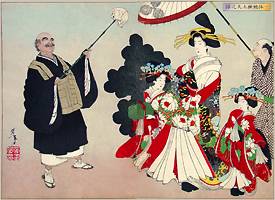James Myoun Ford
“Zen pretty much comes down to three things — everything changes; everything is connected; pay attention.” Jane Hirshfield
“Renunciation is not getting rid of the things of this world, but accepting that they pass away.” Robert Aitken
The first two of Jane Hirshfield’s observations are a summation of reality, and conclude with a way to find our way. All of it is, well, seriously weird. As if we haven’t noticed. The very internal contradiction that everything changes and at the very same time it is all connected creates the tensions of reality. In human terms these are truths we normally only intuit, only glimpse in dreams. And in our lived lives along with all the other problems of survival in a very dangerous place manifest as anxiousness, longing, and dis-ease.
The Zen path is waking into this reality with eyes open. It is found though a process of letting go of our certainties and resting comfortably on the great roller coaster. It is found in the meeting of Ms Hirshfield’s “pay attention” and Aitken Roshi’s “accepting.” Now this accepting is not a passive thing. And it is interesting how he choses the word “renunciation,” a term not in common use. Anyone who knows the roshi’s history understands he was anything but passive in the mess of the world.
The Zen way is a path of engaging with heart, whether it be the endless small things of a monastery, or the socially and politically engaged life of being a citizen in a republic; and accepting it all passes as simply part of the deal.
Piled into this is not knowing and knowing it is always perceived through that glass darkly. It is the mystery of the whole and the parts, where wisdom arises as we come to understand we, you and I are not it, but it is in fact us. Understanding we partake of the great unity, or great empty, or the boundless – but are at the same time temporary as morning dew – is a life-time project. Those who walk a spiritual path like Zen quickly learn there are many traps and byways. It’s easy to rest somewhere or another and not persist to authentic wisdom.
The poet Mary Oliver captures much of the details of what this path looks like at the conclusion of her famous poem In Blackwater Woods.
To live in the world
you must be able
to do three things:
to love what is mortal;
to hold it
against your bones knowing
your own life depends on it;
and, when the time comes to let it
go
to let it go.
Hard as can be. And…
Here is the deal. We rise in this mystery of one and many, of change and unity, we are born to hurt and love and loss. We are called to witness the glory of the universe, and as best we are able to be of some use to each other and the world. That’s it.
Meaning and meaninglessness are dreams of our human making. And they are traps. Rather we are called into the doing. And, despite what you may have been told being and doing are just two ways of saying the same thing. That’s it.
Another poet, it usually is the poets who get it best, Marge Piercy who best sings of this calling of our bones.
Or, if that isn’t confusing enough, how about this from Wumen Huikai, Zen teacher, compiler of the great koan anthology the Gateless Gate, and poet.
Is this one? Is this two?
Just this.
The Zen way…













